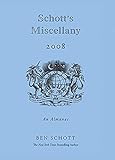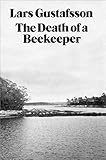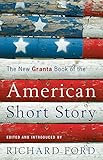
 Schott’s Miscellany 2008: An Almanac, Ben Schott: I know I’m at least a year behind, but Schott’s collections of odd information, lists, etc., is great fun and it doesn’t really matter which year you’re reading. Check out also his Schott’s Food & Drink Miscellany. Ben Schott’s great oddball idea almost makes me a little bit happy, as a person, almost. Briefly, at times.
Schott’s Miscellany 2008: An Almanac, Ben Schott: I know I’m at least a year behind, but Schott’s collections of odd information, lists, etc., is great fun and it doesn’t really matter which year you’re reading. Check out also his Schott’s Food & Drink Miscellany. Ben Schott’s great oddball idea almost makes me a little bit happy, as a person, almost. Briefly, at times.
Am I Insane? Dan Scott Ashwander Published by Carlton Press, New York, 1983 (self-published? I don’t know. 30 pages, hardcover): I like to pick up Ashwander’s book every now and then. I first found a copy when I was a newspaper reporter in the 80s on the Alabama Gulf Coast, and I believe Ashwander lived in the area. No idea how he’s doing now. “About the Author,” on the back jacket, reads “Disabled veteran Dan Scott Ashwander was born in Huntsville, Alabama. Says the author, ‘It sounds unbelievable but I am the one and only God. I have been told this many times through telepathy by the Eternal Spirit.’
“The author has a B.S. degree, is single and this is his first full-length published book.”
As to the title, Ashwander argues and concludes that he is not.
The Last Novel, David Markson: Personally, I liked the earlier Vanishing Point in this series of novels composed of fragments Markson’s detached ‘narrator’ compiles, gradually revealing his own situation (never very cheerful). But The Last Novel is good, too, and there’s nothing out there like these books.

 The Death of a Beekeeper, Lars Gustafsson: I re-read Gustafsson’s beautiful brief novel every year, just as I do William Maxwell’s So Long, See You Tomorrow. They’re two of my most favorite short novels, very different, but similarly moving. Very different in structure, in conception — Gustafsson’s in the form of a series of found, incomplete notebooks left behind by a retired Swedish schoolteacher, deceased; Maxwell’s in the form of a memoir that turns itself inside-out in order to fictionalize the life of a boyhood friend whose emotional experience mirrors his own and provides the first relief from or release of long pent-up grief.
The Death of a Beekeeper, Lars Gustafsson: I re-read Gustafsson’s beautiful brief novel every year, just as I do William Maxwell’s So Long, See You Tomorrow. They’re two of my most favorite short novels, very different, but similarly moving. Very different in structure, in conception — Gustafsson’s in the form of a series of found, incomplete notebooks left behind by a retired Swedish schoolteacher, deceased; Maxwell’s in the form of a memoir that turns itself inside-out in order to fictionalize the life of a boyhood friend whose emotional experience mirrors his own and provides the first relief from or release of long pent-up grief.
Stories by Joy Williams, from her several collections. Williams’ ability to surprise you with astounding moments of brilliant juxtaposition and insight is uncanny. Her intelligence flares up, startling, in your path, as unsettling and fascinating as the biblical burning bush to its observer, there.
 The Granta Book of the American Short Story, edited by Richard Ford, 2007 ed.: I used this book in a class I taught on the contemporary American short story. I miss some of the selections from the earlier edition, such as the stories by Jane and Paul Bowles (his amazing “A Distant Episode”), “No Place for You, My Love,” by Welty (replaced with “Ladies in Spring”), “Good Country People” (replaced by “The Artificial Nigger,” for some reason, it’s said, O’Connor’s favorite story among her own published work), “Lechery,” Jayne Anne Phillips, stories by Leonard Michaels and James Salter. But there’s good new work in there by Barry Hannah, Elizabeth Spencer, Steve Yarbrough, George Saunders, Kevin Canty, Tom Franklin, Denis Johnson, Dennis McFarland, Robert Olen Butler, and, my favorite switch, substituting Joy Williams’ award-winning, devastating story, “The Farm,” for her great story, “Train.” “Train” is great, but “The Farm” is one of those stories that drains your blood, leaves you in some strange suspension of any life beyond what’s in its pages. It takes a while to come back to life, after reading “The Farm.”
The Granta Book of the American Short Story, edited by Richard Ford, 2007 ed.: I used this book in a class I taught on the contemporary American short story. I miss some of the selections from the earlier edition, such as the stories by Jane and Paul Bowles (his amazing “A Distant Episode”), “No Place for You, My Love,” by Welty (replaced with “Ladies in Spring”), “Good Country People” (replaced by “The Artificial Nigger,” for some reason, it’s said, O’Connor’s favorite story among her own published work), “Lechery,” Jayne Anne Phillips, stories by Leonard Michaels and James Salter. But there’s good new work in there by Barry Hannah, Elizabeth Spencer, Steve Yarbrough, George Saunders, Kevin Canty, Tom Franklin, Denis Johnson, Dennis McFarland, Robert Olen Butler, and, my favorite switch, substituting Joy Williams’ award-winning, devastating story, “The Farm,” for her great story, “Train.” “Train” is great, but “The Farm” is one of those stories that drains your blood, leaves you in some strange suspension of any life beyond what’s in its pages. It takes a while to come back to life, after reading “The Farm.”








